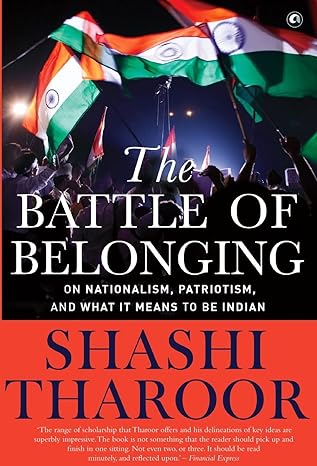Le Monde: “A book that speaks to every democracy in peril.”
The Washington Post: “A stirring defense of pluralism in an age of polarization.”
In a time when the world grapples with questions of identity, nationalism, and the meaning of citizenship, Shashi Tharoor’s The Battle of Belonging arrives like a clarion call—urgent, erudite, and unapologetically passionate. Published in 2020, this magnum opus is not merely a book; it is a political and philosophical treatise that seeks to reclaim the soul of India from the clutches of exclusionary ideologies. Tharoor, with his trademark eloquence and intellectual flamboyance, offers a sweeping analysis of nationalism in its many avatars—civic, ethnic, cultural, and religious—while anchoring his arguments in the Indian context.
As The Guardian aptly noted, “Tharoor writes with the flair of a novelist and the precision of a historian.” This duality—of storyteller and scholar—makes The Battle of Belonging a compelling read not just for Indians, but for anyone invested in the global discourse on identity and democracy.
At its heart, The Battle of Belonging is a meditation on the idea of India—what it was meant to be, what it has become, and what it must strive to remain. Tharoor draws a sharp distinction between civic nationalism, which is inclusive and rooted in shared values and constitutional principles, and ethnic nationalism, which is exclusionary and based on religion, language, or race.
He argues that India’s founding fathers—Nehru, Ambedkar, Gandhi—envisioned a pluralistic, secular republic where citizenship was not contingent on faith or ethnicity. This vision, Tharoor contends, is under siege from a rising tide of majoritarianism that seeks to redefine Indian identity in narrow, sectarian terms.
Quoting Rabindranath Tagore, Tharoor reminds us that “nationalism is a great menace,” when it becomes a tool for division rather than unity. His critique of Hindutva is scathing yet reasoned, grounded not in partisan rhetoric but in constitutional morality.
What sets this book apart is its intellectual breadth. Tharoor doesn’t merely pontificate; he educates. The book is a veritable seminar on nationalism, drawing from a vast array of thinkers—Benedict Anderson, Ernest Renan, Isaiah Berlin, Hannah Arendt, and more. He deftly weaves these global perspectives into the Indian fabric, showing how the battle for belonging is both uniquely Indian and universally human.
For instance, Tharoor juxtaposes India’s constitutional nationalism with the American idea of the “melting pot,” the French model of assimilation, and the German emphasis on blood and soil. This comparative lens enriches the reader’s understanding and situates India’s identity crisis within a broader global narrative.
As The New York Times observed, “Tharoor’s ability to synthesize complex political theory with accessible prose makes this book a rare intellectual achievement.”
No review of a Tharoor book is complete without a nod to his inimitable style. His prose is lush, often bordering on the baroque, but never without purpose. He wields words like a maestro—sometimes to dazzle, sometimes to disarm, always to provoke thought.
There are moments of biting satire, such as when he describes the “WhatsApp University” that fuels misinformation, or when he refers to the “chest-thumping nationalism” that confuses jingoism with patriotism. Yet, there are also passages of lyrical beauty, especially when he speaks of India’s syncretic traditions, its “palimpsest of civilizations,” and its “million mutinies of belonging.”
Tharoor’s colorful personality—equal parts diplomat, debater, and dandy—shines through every page. Whether he’s quoting Shakespeare or Sanskrit, Churchill or Chomsky, he does so with a flourish that is uniquely his own. As The Economist quipped, “Reading Tharoor is like attending a dinner party where the host quotes Voltaire, recites Urdu poetry, and debates Rousseau—all before dessert.”
The book is divided into four parts, each building upon the last like movements in a symphony. Tharoor begins by interrogating the very notion of belonging. What does it mean to belong to a nation, a culture, a people? He explores the psychological and sociological dimensions of identity, laying the groundwork for his later arguments.
Next come the theories of Nationalism – this section is a masterclass in political theory. Tharoor dissects various forms of nationalism—civic, ethnic, cultural, religious—and examines their historical trajectories. He is particularly critical of ethnic nationalism, which he sees as antithetical to India’s pluralistic ethos.
Discussing India’s tryst with nationalism, the book becomes deeply personal and political. Tharoor traces the evolution of Indian nationalism from the freedom struggle to the present day. He celebrates the inclusive nationalism of Gandhi and Nehru, while lamenting the rise of sectarian ideologies in contemporary politics.
The final section is a call to action. Tharoor urges readers to reclaim the idea of India as a secular, democratic republic. He emphasizes the role of civil society, the judiciary, and the media in safeguarding constitutional values.
While the book is rooted in the Indian experience, its implications are global. In an age where populist leaders from Washington to Warsaw are redrawing the boundaries of belonging, Tharoor’s insights resonate far beyond the subcontinent.
His critique of “us vs. them” politics, his defense of liberal democracy, and his celebration of diversity are themes that echo in every corner of the world. As Le Monde noted, “Tharoor’s India is a microcosm of the world’s struggles—a nation wrestling with its soul, a democracy at a crossroads.”
No book is without its flaws, and The Battle of Belonging is no exception. Some critics have argued that Tharoor’s prose, while elegant, can be dense and overly academic. Others feel that his critique of Hindutva, though powerful, might alienate readers who see it as a cultural rather than political identity.
Moreover, while Tharoor is eloquent in diagnosing India’s ailments, his prescriptions are sometimes vague. The call to “reclaim India” is stirring, but the roadmap remains abstract.
Yet, these are minor quibbles in an otherwise monumental work. As The Washington Post put it, “Even when you disagree with Tharoor, you cannot ignore him. He forces you to think, to question, to engage.”
The Battle of Belonging is more than a political book—it is a love letter to an India that is inclusive, diverse, and democratic. It is a reminder that nationalism need not be a zero-sum game, that belonging can be expansive rather than exclusionary.
In a world increasingly defined by walls—literal and metaphorical—Tharoor’s vision is one of bridges. He invites us to imagine a nation where identity is not a weapon but a tapestry, where difference is not a threat but a strength.
To read this book is to engage in a conversation with India’s conscience. And in Shashi Tharoor, that conscience finds a voice that is as eloquent as it is urgent.
A must-read for anyone who cares about democracy, identity, and the future of pluralism—not just in India, but across the world.
Related Reading
![]()


